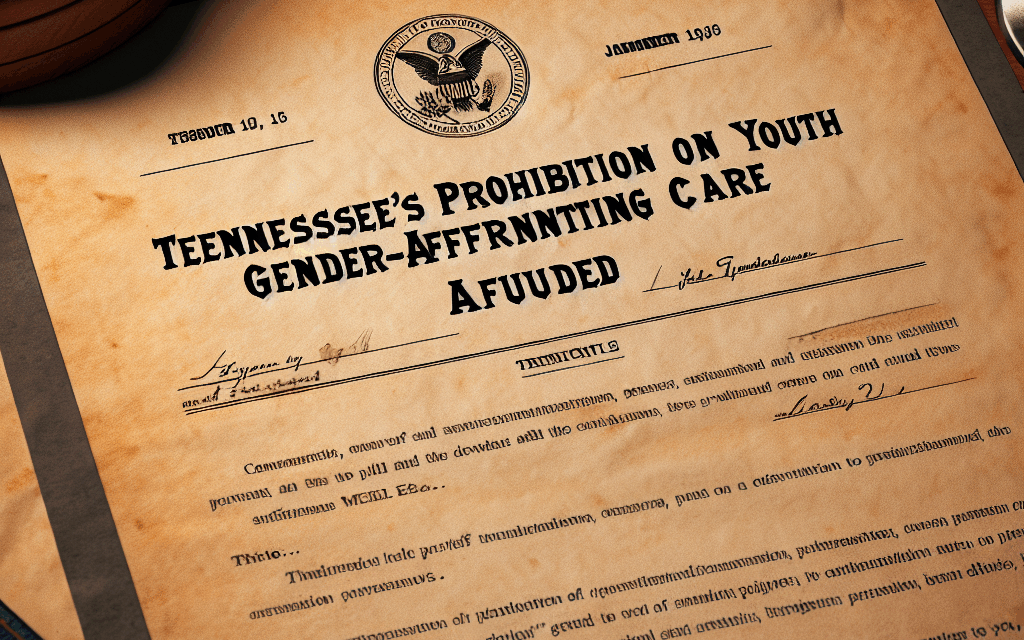Supreme Court Affirms Tennessee’s Prohibition on Youth Gender-Affirming Care
The recent decision by the Supreme Court to uphold Tennessee’s prohibition on gender-affirming care for minors has sparked a nationwide debate on the rights of transgender youth, parental authority, and the role of the state in healthcare decisions. This article delves into the implications of this ruling, exploring the legal, medical, and social dimensions of the issue. We will examine the background of the case, the arguments presented, the potential consequences for transgender youth, and the broader implications for healthcare policy across the United States.
Background of the Case
The legal battle surrounding Tennessee’s prohibition on gender-affirming care for minors began in 2021 when the state legislature passed a law banning healthcare providers from administering puberty blockers, hormone therapy, or surgical procedures to individuals under the age of 18. Proponents of the law argued that it was necessary to protect minors from making irreversible decisions about their bodies, while opponents contended that it infringed on the rights of transgender youth and their families to make informed healthcare choices.
In 2022, a coalition of advocacy groups, including the American Civil Liberties Union (ACLU) and the Human Rights Campaign, filed a lawsuit challenging the law. They argued that the prohibition violated the Equal Protection Clause of the Fourteenth Amendment and constituted cruel and unusual punishment. The case made its way through the lower courts, ultimately reaching the Supreme Court, which decided to hear the case in early 2023.
The Supreme Court’s ruling, which affirmed the lower court’s decision to uphold the law, has significant implications for transgender youth in Tennessee and beyond. The court’s decision reflects a growing trend among several states to enact similar bans, raising concerns about the future of gender-affirming care across the country.
Legal Arguments and Implications
The legal arguments surrounding the prohibition on gender-affirming care for minors are complex and multifaceted. Supporters of the law argue that it is a necessary measure to protect vulnerable youth from making decisions that could have lifelong consequences. They contend that minors lack the maturity and understanding to make informed choices about their gender identity and that the state has a responsibility to intervene in such cases.
On the other hand, opponents of the law argue that it violates the rights of transgender youth and their families. They assert that gender-affirming care is a medically necessary treatment for many transgender individuals and that denying access to such care can lead to severe mental health consequences, including increased rates of depression, anxiety, and suicidal ideation.
Several key legal principles come into play in this case:
- Equal Protection Clause: Opponents of the law argue that it discriminates against transgender individuals by denying them access to healthcare that is available to their cisgender peers.
- Parental Rights: The law raises questions about the extent of parental authority in making healthcare decisions for their children, particularly in cases involving gender identity.
- Medical Standards: The ruling also touches on the role of medical professionals in determining the appropriate course of treatment for transgender youth, as many medical organizations support gender-affirming care as a best practice.
The Supreme Court’s decision to uphold the law sets a precedent that could embolden other states to enact similar prohibitions, potentially leading to a patchwork of laws across the country that vary significantly in their treatment of transgender youth. This could create significant barriers to accessing care for those who need it most.
Impact on Transgender Youth and Families
The implications of Tennessee’s prohibition on gender-affirming care extend far beyond legal considerations; they have profound effects on the lives of transgender youth and their families. Access to gender-affirming care has been shown to improve mental health outcomes for transgender individuals, and the denial of such care can have devastating consequences.
Research indicates that transgender youth who receive gender-affirming care experience:
- Lower Rates of Depression: Studies have shown that access to hormone therapy and other forms of gender-affirming care is associated with significantly lower rates of depression among transgender youth.
- Reduced Suicidal Ideation: Transgender individuals who receive appropriate medical care report lower rates of suicidal thoughts and attempts compared to those who do not.
- Improved Quality of Life: Many transgender youth report feeling more comfortable in their bodies and experiencing an overall improvement in their quality of life after receiving gender-affirming care.
Conversely, the prohibition on such care can lead to:
- Increased Mental Health Issues: Denying access to gender-affirming care can exacerbate feelings of dysphoria and lead to increased rates of anxiety and depression.
- Family Strain: Families may experience significant stress and conflict as they navigate the challenges of supporting a transgender child in a hostile legal environment.
- Risk of Unsafe Alternatives: Some youth may seek out unsafe or unregulated methods to transition, putting their health at risk.
The emotional toll on families can be immense. Parents often feel helpless as they watch their children struggle with their identities in a society that may not accept them. The legal landscape can create additional barriers, forcing families to make difficult decisions about their children’s healthcare and well-being.
Medical Perspectives on Gender-Affirming Care
The medical community has largely supported gender-affirming care as a necessary and effective treatment for transgender individuals. Major medical organizations, including the American Academy of Pediatrics, the American Medical Association, and the Endocrine Society, endorse gender-affirming care as a best practice for treating transgender youth.
Gender-affirming care typically includes:
- Puberty Blockers: Medications that pause the physical changes associated with puberty, allowing youth to explore their gender identity without the distress of unwanted physical changes.
- Hormone Therapy: Treatment involving estrogen or testosterone to help individuals develop secondary sexual characteristics that align with their gender identity.
- Surgical Interventions: Procedures that may be considered for older adolescents, including chest or genital surgeries, which are often pursued after extensive counseling and evaluation.
Research has consistently shown that gender-affirming care is associated with positive mental health outcomes. A study published in the journal “Pediatrics” found that transgender youth who received hormone therapy reported significant improvements in their mental health, including reductions in depression and anxiety symptoms.
However, the prohibition on gender-affirming care in Tennessee raises questions about the ability of medical professionals to provide appropriate care. Healthcare providers may face legal repercussions for offering treatments that are widely accepted as necessary, creating a chilling effect on the practice of medicine in the state.
Broader Implications for Healthcare Policy
The Supreme Court’s decision to uphold Tennessee’s prohibition on gender-affirming care for minors has broader implications for healthcare policy across the United States. As more states consider similar laws, the landscape of healthcare for transgender individuals is at risk of becoming increasingly fragmented and inequitable.
Several key issues arise from this ruling:
- Access to Care: The prohibition on gender-affirming care may lead to significant disparities in access to healthcare for transgender youth, particularly in states with restrictive laws.
- Medical Autonomy: The ruling raises questions about the autonomy of healthcare providers to make decisions based on established medical guidelines and the best interests of their patients.
- Public Health Concerns: Denying access to gender-affirming care can have public health implications, as untreated mental health issues among transgender youth can lead to increased healthcare costs and societal burdens.
As states grapple with these issues, advocacy groups are mobilizing to challenge restrictive laws and promote policies that support the rights of transgender individuals. The legal landscape is evolving, and the outcomes of these battles will shape the future of healthcare for transgender youth in the United States.
Conclusion
The Supreme Court’s affirmation of Tennessee’s prohibition on youth gender-affirming care marks a significant moment in the ongoing struggle for transgender rights in the United States. The ruling has far-reaching implications for the lives of transgender youth, their families, and the healthcare system as a whole.
As we have explored, the legal arguments surrounding this case are complex, with significant implications for equal protection, parental rights, and medical standards. The impact on transgender youth and their families is profound, with access to gender-affirming care linked to improved mental health outcomes and overall quality of life.
The medical community largely supports gender-affirming care as a necessary treatment, and the prohibition raises serious concerns about the ability of healthcare providers to offer appropriate care. Furthermore, the broader implications for healthcare policy highlight the need for advocacy and action to protect the rights of transgender individuals across the country.
As this issue continues to evolve, it is crucial for society to engage in informed discussions about the rights of transgender youth, the role of parents in healthcare decisions, and the responsibilities of the state in protecting vulnerable populations. The future of gender-affirming care hangs in the balance, and the outcomes of ongoing legal battles will shape the landscape for generations to come.





